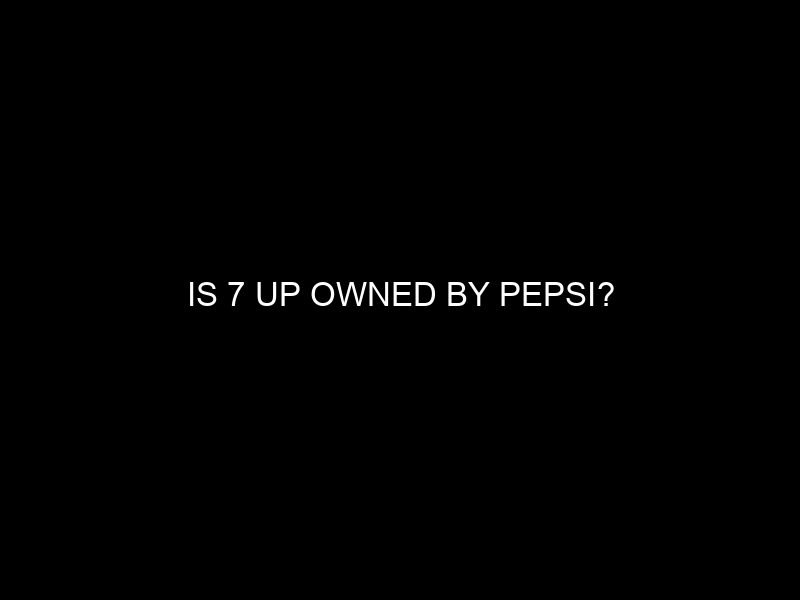7 Up, a renowned lemon-lime flavored soft drink, has been a popular beverage choice worldwide for many years. Its crisp, refreshing taste has made it a staple in many households and social gatherings. As a professional with extensive experience in Nigerian business and a deep understanding of the beverage industry, including the workings of 7 Up, I offer insights into the ownership of this iconic brand.
The Ownership History of 7 Up
Early Beginnings and Brand Evolution
7 Up’s journey began in the 1920s, created by Charles Leiper Grigg. Originally named “Bib-Label Lithiated Lemon-Lime Soda,” it was later renamed to the more catchy “7 Up.” The brand underwent several ownership changes throughout its history, reflecting the dynamic nature of the beverage industry.
The Acquisition by PepsiCo
In the late 20th century, 7 Up became part of a larger narrative in the soft drink industry’s competitive landscape. PepsiCo, a global food and beverage leader, known for its titular cola drink, Pepsi, acquired the rights to 7 Up in several international markets. This acquisition marked a significant expansion of PepsiCo’s portfolio and influence in the global beverage market.
Understanding PepsiCo’s Strategy
PepsiCo’s acquisition of 7 Up can be seen as a strategic move to diversify and strengthen its product range. By adding 7 Up to its lineup, PepsiCo could offer a popular non-cola alternative, appealing to a broader consumer base. This strategy demonstrates PepsiCo’s commitment to catering to diverse taste preferences and market demands.
The Impact of 7 Up’s Ownership on the Beverage Industry
Market Dynamics and Consumer Preferences
The inclusion of 7 Up under PepsiCo’s umbrella influenced market dynamics significantly. It allowed PepsiCo to compete more robustly with other beverage giants, especially in markets where lemon-lime flavors were in high demand. The brand’s ownership also impacted consumer preferences and purchasing decisions, as it became associated with PepsiCo’s reputation for quality and innovation.
The Role of 7 Up in PepsiCo’s Global Strategy
7 Up plays a crucial role in PepsiCo’s global strategy, especially in regions like Nigeria, where unique consumer preferences shape the beverage market. As a non-cola, caffeine-free option, 7 Up offers an alternative for consumers seeking variety. Its ownership by PepsiCo ensures consistent quality, extensive distribution, and marketing support, enhancing its appeal in diverse markets.
The Nigerian Perspective: 7 Up’s Presence and Performance
Market Penetration and Consumer Reception in Nigeria
In Nigeria, 7 Up’s presence is strong, thanks to PepsiCo’s robust distribution network and marketing strategies. The brand enjoys considerable popularity, often seen as a refreshing alternative to cola drinks. Its performance in the Nigerian market is a testament to PepsiCo’s ability to adapt and thrive in varied cultural and economic landscapes.
The Influence of Local Business Dynamics
The Nigerian business environment, characterized by its own set of challenges and opportunities, plays a significant role in the marketing and distribution of 7 Up. Understanding local consumer behavior, economic factors, and competitive dynamics is crucial for PepsiCo to maintain 7 Up’s relevance and popularity in the Nigerian market.
FAQs: Addressing Common Queries About 7 Up and PepsiCo
Q1: Is 7 Up owned by Pepsi everywhere? A1: PepsiCo owns the rights to 7 Up in most international markets, but not everywhere. In some regions, 7 Up is owned or distributed by different companies.
Q2: How has PepsiCo’s ownership influenced 7 Up’s formulation? A2: While PepsiCo ensures high-quality standards, the fundamental formulation of 7 Up has largely remained consistent, retaining its unique lemon-lime flavor that consumers love
.
Q3: Are there any significant differences in 7 Up products across different markets? A3: Yes, there can be variations in 7 Up’s formulation in different markets to cater to local tastes and regulatory requirements. However, the core essence of the drink generally remains the same.
Q4: How does PepsiCo integrate 7 Up in its overall product strategy? A4: PepsiCo integrates 7 Up as a key non-cola beverage in its portfolio, using it to diversify its offerings and appeal to a wider audience who may prefer lemon-lime flavors over cola.

Leave a Reply